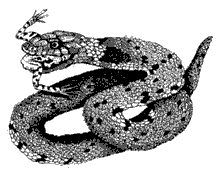|
|
|
|
|
|
Salmonella
|
Many reptiles can carry salmonella without showing symptoms. Reptile fecal carriage rates can be more than 90%. Elimination of salmonella in reptiles with antibiotics leads to increased resistance. Elimination of salmonella in reptiles with antibiotics has been unsuccessful. Reptiles can become infected with salmonella through contact with other reptiles. Reptiles can become infected with salmonella by ingesting feces (a typical hatchling behavior). |
 |
|
1. Wash hands with soap and water after handling any reptile. Wash thoroughly for at least 30 seconds with antibacterial soap and hot water. Washing with only water is ineffective in eliminating salmonella. 2. Keep reptiles out of kitchens and away from any surfaces where human food is stored prepared or served. Do not use kitchen sinks to clean reptile accessories or cages. Do not touch human food or dishes, pots, etc. after handling any reptile or reptile accessory without first washing hands. 3. Keep reptile enclosures and accessories as clean as possible. 4. Do not permit children under 12 to handle reptiles unsupervised. Teach children to wash their hands after handling reptiles. Reptiles should not be kept in any child care facility where toddlers and pre-schoolers are cared for. Reptiles in classrooms should not be handled unless proper hand washing and clean-up areas are available to staff and students. 5. Do not handle any reptile or reptile accessory if your hands have open cuts or scrapes. If this is unavoidable, cuts need to be well covered with dressings. Rubber gloves are also recommended. 6. Wash reptile accessories with care. Avoid splashes to face. If splashing and / or frequent handling is unavoidable consider wearing goggles and surgical gloves. 7. Avoid using bathtubs or shower stalls to clean reptile accessories. If this is unavoidable, be sure to disinfect area immediately afterwards. 8. Use cleaning products recommended by your pharmacist, physician, or veterinarian. Disinfectant lotions, pump sprays, and / or similar products should be carried whenever reptiles are going to be handled in the field, swap meets, or other locations where hand washing facilities may be absent. |
|